Multnomah County alone has created more new “professional and technical service” jobs in the last three years than the Columbia River Crossing was projected to create throughout the region, in all sectors combined, by 2030.
It’s a fact that was underscored Friday by Mayor Charlie Hales’ announcement that San Francisco-based startup Airbnb will move 160 employees and its North American operational headquarters to Portland’s Old Town area.
That was the latest sign that Portland’s tech sector is in the middle of an historic boom — and a stark contrast with the freeway-rail project, once called essential to the region’s economy, that seems to have been killed by the state legislature one week ago.
According to the Columbia River Crossing project team’s own calculations, the long-term economic impact of increasing the capacity of Interstate 5 would be to create 3,441 more jobs around the region by 2030. That’d be about 0.15 percent of the region’s future workforce.
But even as the consensus around the CRC project collapsed (leaving behind, of course, hundreds of millions of dollars for other local priorities) Portland’s central city became a new hub for white-collar service employees at tech companies like New Relic, Walmart Labs, Urban Airship and eBay.
It’s added 4,000 new jobs in the professional and technical services industry since 2011, according to state estimates.
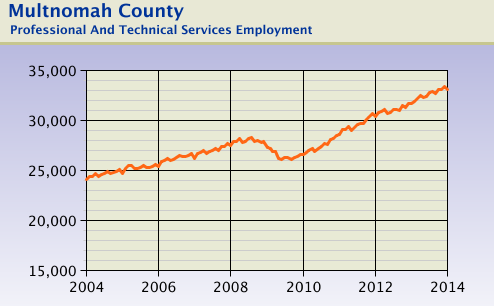
“Computer programming jobs are up 15 percent in the last few months — that’s fantastic,” state economist Christian Kaylor said in a December interview. “Multnomah County is creating in the last three years, on average, 20,000 jobs a year.”
The county’s key advantage in this job growth, Kaylor said, is its huge supply of skilled labor, driven by an apparently overwhelming desire of college graduates to live in Portland.
“People with college degrees are disproportionately moving to the City of Portland and almost actively avoiding Washington County, Clackamas County, Clark County,” Kaylor said. “Which is also new.”
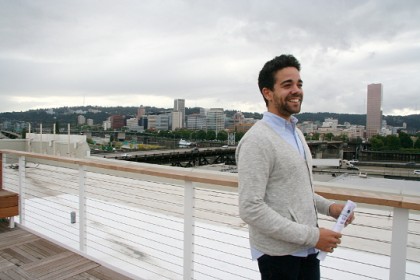
that employers are increasingly trying to locate in places
employees find desirable.
It’s not as if good walking, biking and transit options are the only factors, Kaylor said. But he thinks they’re “huge” in the city’s appeal.
Kaylor said he’s actually worried about the economic future of Clackamas County, which of all the region’s counties seems to be struggling most to attract young residents.
“The City of Portland is growng five times faster than Clackamas County — that’s just nuts,” he said. “If you look at just the population 18-64, Clackamas County is shrinking. … To have so much job growth centered in an urban area in a region — this is something we haven’t seen since the 1940s with the Liberty Shipyards.”
This is a trend we’ve seen here at BikePortland in our coverage of the commercial real estate scene, which has been investing more and more in bike-friendly facilities, locating close to homes that appeal to bike-friendly workers and choosing office buildings that are close to active urban places like food cart pods.
“To stay relevant as an employer, you have to create places where people really want to be,” developer Leonard Barrett said last fall.



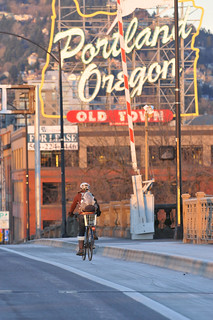

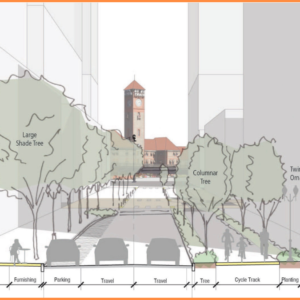

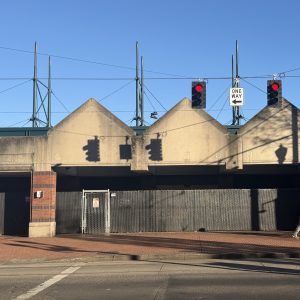
Thanks for reading.
BikePortland has served this community with independent community journalism since 2005. We rely on subscriptions from readers like you to survive. Your financial support is vital in keeping this valuable resource alive and well.
Please subscribe today to strengthen and expand our work.
“People with college degrees are disproportionately moving to the City of Portland and almost actively avoiding Washington County, Clackamas County, Clark County.”
Is this actually true? Michael, you’re handy with census data! I mean, I feel like we’re constantly hearing how important the Silicon Forest (Hillsboro-centric tech cluster around Intel) and apparel (Nike, etc.) are to the regional economy, and those are all in WaCo. I understand some smaller tech companies are locating in the central city (don’t forget Elemental), but Intel is still the 600 lb gorilla. As Intel expands, are the new employees disproportionately choosing to live in Portland and commute to Hillsboro? I think if this is true, our regional leaders aren’t getting the message.
Yes, we’re definitely hearing this from our leaders. I didn’t check Kaylor’s work, but he’s one of the people in town who’s even more obsessed with these numbers than I am. One of the main themes of our conversation was the fact that Washington County’s job growth (while strong, though no longer clearly stronger than Multnomah County’s) is happening in spite of its failure to attract recent college grads at the rate Portland is.
There’s no question that Washington County continues to be very important to local job growth, but it’s not the dominant force it was in the late 90s.
http://www.oregonlive.com/clackamascounty/index.ssf/2013/09/clackamas_county_lagging_in_jo.html
Changes in the market take time to percolate into the conventional wisdom. I think this is one of those cases.
Intel recently announced a layoff of 5000+ employees worldwide; not sure where most of them were concentrated. Just a quick peek at their jobs site lists 522 open positions in Hellsboro and 309 in Silly Valley – not too big a difference, really. I think in time you’ll see more smaller Internet companies take advantage of Portland, and they’ll collectively keep pace with or even outpace the 600lb gorilla. Silicon is not where the big growth is right now (doing things with it is).
Why this has anything to do with the CRC, I don’t know.
Whether or not our tech sector is “booming” depends on what you are comparing it to. We don’t rank in the top 15 future tech cities according to one source (http://www.slate.com/blogs/business_insider/2014/01/11/best_performing_u_s_cities_of_2013_2014.html). I don’t know if the percentage growth shown above is a lot or not, since there is not basis of comparison.
This doesn’t mean what you write isn’t true, but it’s really an inward looking article. It compares Multnomah to Washington, and Multnomah to itself, and makes all kinds of assumptions about why people want to live here that as far as I can tell are just being pulled out of thin air.
And on top of all of this, and while it’s great news (if true) that MultCo is now growing in jobs, it remains true that a ton of these MultCo migrants commute out to jobs in Hillsboro, and that runs completely contrary to the whole non-auto, bike/walk centric theme of the post.
We have to move tens of thousands of people daily from the east side of Portland to Hillsboro, and almost all of them drive. That’s not CRC, it’s the Sunset Highway.
True, and it has everything to do with our regional and statewide transportation spending priorities. Our decision makers are mostly still in the old mindset that economic development is all about adding/managing roadway capacity so people and freight can make reliable, long-distance trips around the region. Bike/ped project are all well and fine, but they’re really for underachieving trustfundy college grads who work 25 hours a week at a service industry job, bike around, and sit in a coffee shop checking social media on their MacBook while they stroke their creative facial hair.
The ODOT folks aren’t really dinosaurs…they just need good data. Show them a convincing argument that investments that make Portland a great place to walk and bike yield big benefits to the regional economy, and that’s where the money will start getting spent. Until that argument wins the day, we can all look forward to $ hundreds of millions spent on I-5 widening through the Rose Quarter and a reboot of the Westside Bypass. Nobody needs permission from the WA legislature to do those.
I have creative facial hair. Now I feel bad 🙁
Obviously, you’re a slacker. 😉
I appreciate your skepticism, Paul. As I write in the piece (echoing Kaylor), transportation is definitely not the only factor here. But the causal assumptions in the article are Kaylor’s, whose job it is to assess the trends in job growth and the factors behind them. (I agree with him, obviously.)
As for whether we’re in a boom, that Milken Institute study didn’t look at tech jobs, it looked at all jobs. You’re right that if I’d had more time it would have been useful to compare “professional and technical services” growth in other metros, though.
As for Portland-to-Hillsboro commuting, it seems to me that dealing with the Sunset Corridor every morning (and/or the Blue Line through the tunnel, and/or a bike over the hill) is pretty strong evidence that people are prioritizing their preference to live in Portland.
There still are two futures…each with different trajectories …much as it was after the last big economic shocks of the great depression/ ww2…jobs and money flow to the undervalued lands (back then it was the hollowed out 1920s rural areas that became strip malls/ suburbs in the 1950s and now its prewar city centres with underused infrastructure and building space drawing folks back in). These under used areas were the Irvingtons, prePearl, etc.
The suburbs (east Portland too) and smaller cities are still on the older trajectory and will change when the easy city center capacity is full (or overpriced) and thus these jobs and housing demands wash up in the outer areas. Though its the reverse of the Google Buses…we may still need the FTA funded portions of the CRC project to accommodate the mobility choices that the housing + schooling for the new workers in 5 to 10 years will generate when they settle down with multiple kids but minus the 2 cars. (Unless a new future trajectory is created…by the CoP radically shifts its investment from mobility to proximity by supporting schools…such as buying up all the old school facilities to land bank them and then this funding stream might help fix some of the internal problems at Portland Schools.)
You do realize that if you follow the link in that article to the actual study, that Portland ranked in at 21this year – up two spots from last year.
And highlighted in the study for Portland are the assets.
ASSETS:
»» The metro has a well-established, thriving high-tech cluster
and ranks fourth in the nation for tech share of GDP.
»» The young and highly skilled workforce is attractive to
potential employers.
Looks to me like creative facial hair might be an assets to potential employers. Perhaps I should grow mine out….
I agree, the logic of this article is a real stretch of the imagination.
I’d say we have to wait 15 years to know for sure, rather than making generalizations because ONE company moved here.
Which “ONE” company are you talking about? I only ask because so many have moved here in the last year.
“Kaylor said he’s actually worried about the economic future of Clackamas County, which of all the region’s counties seems to be struggling most to attract new residents.”
Just avoiding “Portland Creep”.
“which of all the region’s counties seems to be struggling most to attract new residents.”
I find this framing highly problematic. As if growth were essential, the goal. Nothing could be further from the truth. We don’t need new residents. In fact there are a thousand reasons not to add more people to our county, or to any county. Alternatives to Growth Oregon was created to counter this kind of (dominant) thinking.
Well, considering that people are going to be living somewhere if they choose to live in a dense urban environment that is density growth versus acreage growth.
Clackastan just wants more people so they can justify expanding the UGB. The only “Portland Creep” it seems is higher earning workers seeing some of Clackamas County’s more… regressive cultural elements… and start creeping away quickly.
I’ve rephrased to “attract young residents,” since Kaylor’s point was about dependency ratio, not really growth.
Growth is indeed the goal of most governments and businesses, though IMHO it often runs contrary to sustainable practices (transportation especially). I often point people who blame new bike lanes for increased traffic to the websites of local economic development agencies touting their successes. Where I live 67% of residents voted to build a giant football stadium (and a behemoth neighboring mixed-use development funded by a famous retired football player) – now there are rapidly growing protests about what will happen with traffic and parking overflow during game days when they open on August 2nd. It’s actually resulted in a decrease in bike commuting (which I assume is an increase in car commuting as public transit sucks here) because it closed a separated trail serving as a main artery to large employers, and we’re now scrambling to re-address this impact for game days as well, because our suggestions were ignored three years ago citing a lack of funds.
My point is that growth and proper infrastructure investment MUST go hand in hand, and at least Portland has done a decent job of that.
“growth and proper infrastructure investment MUST go hand in hand”
This is true only if we assume growth to be prior and desirable. Because we would have a lot easier time fixing, much less improving, our infrastructure if we weren’t constantly encouraging more people to move here, measuring our success as a city, a region, by how our growth compares with others.
Need to stop taxpayer financing of big families. Every social security number issued so far is grandfathered in to the old system but going forward only two child tax credit deductions will be allowed per family.
You can still have as many kids as you want; the rest of us won’t have to pay for it. Businesses may balk because they’ve relied on an over-supply of manpower to keep labor costs low. The problem is that even if America’s birthrate voluntarily drops to 1.0 per family we have hundreds immigrating every day and the unstoppable technological push to mechanize all work. I suspect we could seal the country in a bubble and we’d still have too many unemployed because we can technologically eliminate jobs much more easily these days.
So we REALLY need to work on the curtailing of population growth; total employment opportunities will continue to decrease no matter what and there’s bad moon is on the rise.
Agreed, but I don’t assume growth to be desirable, I’m merely pointing out that it is indeed the goal of most governments and business, and even the measure of success in America as you correctly indicate. q`Tzal says below that immigration is a significant factor in growth; not only is that true, but many large companies have lobbied congress for years to raise visa limits, citing a lack of educated manpower here in the US. When that happened in the mid-90’s it fueled the so-called Internet boom, but in the ensuing bust we sent all those people back to their respective countries to compete with us with experience in product and project management, marketing, finance, etc. Growth, as we’ve seen time and again, is not infinitely sustainable.
I think we have a choice of either discouraging governments and businesses from pursuing growth (ideally), or encouraging them to do so in a sustainable manner (realistically), which in my book means forcing developers to invest in and accommodate safe transportation for alternatives to the automobile rather than allowing them maximum lot utilization. Some of the plans our BPAC is reviewing show the range of this, from one developer working with Alta to ensure their residential complex on a busy expressway allows safe throughput for pedestrians and bicyclists to/from the nearby train stop and bike path, to another (famous football player) whose company says widening the sidewalk from 10′ to 30′ in select spots should easily accommodate both bicyclists and game-day crowds from the neighboring stadium.
I agree with the general point (“growth” per se is a nonsense goal) but misses an important proximate issue. Most American cities finance development & infrastructure with bonds. Yesterday’s bonds are paying for today’s sewers and bus stops, today’s revenues just pay the interest on those bonds.
So in that sense, yes, an American city that isn’t growing (at least, its revenues) is actually dying, because it has to devote proportionally more of its revenue to servicing past debt.
Portland is trying to boost the denominator in this equation. Instead of adding new residents, let’s acquire richer residents. Thus: packing Old Town with tech firms and Ladd’s Addition with tech workers. Don’t expect much attention paid to “industrial diversity” or “affordable housing” in this scheme though.
Charles Marohn (“Strong Towns”) has written extensively about this: http://grist.org/sprawl/2011-06-22-the-american-suburbs-are-a-giant-ponzi-scheme/
Welcome to OldTown, guys!
Oh, wow. You guys are going to be in my building! Congrats, Thetus has built it into a very nice space.
Just as a individual needs a diversified investment portfolio, a community needs a diversified employment and financial structure. Plenty of people seem willing to completely give up on manufacturing, transportation and materials sectors while focusing on the “creative” and professional services sectors. One must remember that employers without massive financial investments in plant, equipment and other tangible assets tied to a geographic location can easily move or outsource their functions. It’s good news that Airbnb or similar employers are moving to Portland, but they can just as easily move to Austin, New Orleans or whatever the new creative hotspot is next year or the year after.
I think using this recent employment information as proof the CRC is unnecessary is akin to using the “Polar Vortex” as proof that climate change is a fraud.
Excellent point! I doubt that those 160 Airbnb employees decided to collectively relocate to Portland. More likely, the decision was made by someone near the top who made the personal decision that they wanted to be in Portland, for whatever reason. Keep in mind that they didn’t come to Portland to “hire” 160, they brought the jobs with them, so SF’s loss is Portland’s gain.
I’m sure there are many employees who currently work remotely in Portland, but will now have a local office as their designated worksite. This situation describes a friend of mine who lives in Portland and is a current AirBnB employee.
Good stuff, Michael. Very intriguing comparison.
well SF lost Portland gain seems rather odd, We have locals looking for work that have been in this market for along time do we just keep relocating ppl? and not focusing on local workers? hope they hire local ppl and I’m just saying like 5 openings but something that can help Oregon workers. not transplant mode!
Sounds to me like Portland needs to brace itself for the inevitable encroachment of $4 toast.
See: http://venturebeat.com/2013/08/21/4-toast-why-the-tech-industry-is-ruining-san-francisco/